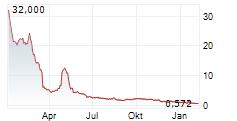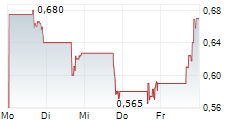Priority Review Vouchers (PRVs) are transferable and, in past transactions by other companies, have sold for prices up to $350 million
1.3 to 4 million cholera cases and 21,000 to 143,000 cholera-related deaths occur each year worldwide
SAN FRANCISCO, CA / ACCESS Newswire / February 18, 2025 / Jaguar Health, Inc. (NASDAQ:JAGX) ("Jaguar" or the "Company") and Jaguar family company Napo Pharmaceuticals ("Napo") today announced that, on January 29, 2025, they extended their collaboration with Streeterville related to Napo's plans to develop its NP-300 drug product candidate for the symptomatic relief of diarrhea and dehydration in cholera patients and pursue a possible Tropical Disease Priority Review Voucher ("TDPRV") from the U.S. Food and Drug Administration ("FDA") for this indication.
With the sunset of the FDA's Rare Pediatric Disease PRV program in December 2024, and the sunset of the FDA's Medical Countermeasures PRV Program in October 2023, the TDPRV Program is currently the FDA's only active PRV program - so there will possibly be fewer PRVs available for purchase, which could increase the value of TDPRVs, spurring increased interest and investment in tropical diseases.
"We at Jaguar and Napo find it very rewarding to work in the pharmaceutical industry and be in a position to possibly help address such an important global health need and meet stakeholder expectations," stated Lisa Conte, Jaguar's founder, president, and CEO. "We are thankful to both the FDA for creating the TDPRV Program to drive development of drugs to benefit patients suffering from serious but often neglected tropical diseases, and to Streeterville for their commitment to this unmet need in cholera patients. Streeterville has extended the due date until January 2026 for the funding they provided Napo for this clinical development program."
PRV programs incentivize the development of therapies for underfunded diseases. A PRV entitles the bearer to regulatory review by the FDA in approximately six months rather than the standard ten months. Under the TDPRV Program, the FDA may award a PRV following approval of a treatment for a neglected tropical disease such as cholera. PRVs are transferable and, in past transactions by other companies, have sold for prices up to $350 million.
More than a billion people - mostly in developing countries - are infected with one or more of the neglected tropical diseases.1 Established in 2007, the TDPRV Program is the only FDA PRV program without a sunset provision. Although cholera is an orphan indication in the U.S., it is estimated that, worldwide, 1.3 to 4 million cholera cases and 21,000 to 143,000 cholera-related deaths occur each year, according to the Centers for Disease Control and Prevention of the U.S. Department of Health & Human Services.2
Napo has received orphan-drug designation for cholera with crofelemer, the Company's FDA-approved drug product. NP-300 is a drug candidate under the botanical guidance of the FDA. It is a standardized and proprietary Napo botanical extract that is distinct from crofelemer with the same paradigm-shifting first-in-class mechanism of action. NP-300 is sustainably derived from the same source as crofelemer: the Croton lechleri tree.
Rare/orphan diseases are a core Jaguar focus. Jaguar is supporting three proof-of-concept (POC) investigator-initiated trials (IIT), and conducting two Phase 2 studies, of crofelemer for the rare diseases short bowel syndrome with intestinal failure (SBS-IF) and/or microvillus inclusion disease (MVID) in the US, EU, and/or Middle East/North Africa regions. The first POC IIT result is expected to potentially be available in H1 2025, with additional POC IIT results expected for SBS-IF and MVID throughout 2025.
Approximately one in 10 persons infected with cholera will have severe disease characterized by profuse watery diarrhea, vomiting, and leg cramps. In these people, rapid loss of body fluids leads to dehydration and shock. Without treatment, death can occur within hours. Cholera is now endemic in many countries outside the U.S. From January 1, 2024 to July 28, 2024, a cumulative total of 307,433 cholera cases and 2,326 deaths were reported from 26 countries across five World Health Organization (WHO) regions.3 WHO classified the global resurgence of cholera as a grade 3 emergency in January 2023, the highest internal level for emergencies in WHO.2 Based on the number of outbreaks and their geographic expansion, alongside the shortage of vaccines and other resources, WHO continues to assess the risk at the global level as very high and the event remains classified as a grade 3 emergency.3
About the Jaguar Health Family of Companies
Jaguar Health, Inc. (Jaguar) is a commercial stage pharmaceuticals company focused on developing novel proprietary prescription medicines sustainably derived from plants from rainforest areas for people and animals with gastrointestinal distress, specifically associated with overactive bowel, which includes symptoms such as chronic debilitating diarrhea, urgency, bowel incontinence, and cramping pain. Jaguar family company Napo Pharmaceuticals (Napo) focuses on developing and commercializing human prescription pharmaceuticals for essential supportive care and management of neglected gastrointestinal symptoms across multiple complicated disease states. Napo's crofelemer is FDA-approved under the brand name Mytesi® for the symptomatic relief of noninfectious diarrhea in adults with HIV/AIDS on antiretroviral therapy. Jaguar family company Napo Therapeutics is an Italian corporation Jaguar established in Milan, Italy in 2021 focused on expanding crofelemer access in Europe and specifically for orphan and/or rare diseases. Jaguar Animal Health is a Jaguar tradename. Magdalena Biosciences, a joint venture formed by Jaguar and Filament Health Corp. that emerged from Jaguar's Entheogen Therapeutics Initiative (ETI), is focused on developing novel prescription medicines derived from plants for mental health indications.
For more information about:
Jaguar Health, visit https://jaguar.health
Napo Pharmaceuticals, visit www.napopharma.com
Napo Therapeutics, visit napotherapeutics.com
Magdalena Biosciences, visit magdalenabiosciences.com
Visit the Make Cancer Less Shitty patient advocacy program on Bluesky, X, Facebook & Instagram
Forward-Looking Statements
Certain statements in this press release constitute "forward-looking statements." These include statements regarding Napo's plans to develop NP-300 for the symptomatic relief of diarrhea and dehydration in cholera patients and pursue a possible TDPRV from the FDA for this indication, the expectation that NP-300 may receive FDA approval for the symptomatic relief of diarrhea and dehydration in cholera patients and that, upon such approval, the FDA may award a TDPRV for NP-300 for this indication, the expectation that, due to the sunset of the FDA's other two PRV program, there will possibly be fewer PRVs available for purchase - which could increase the value of TDPRVs and spur increased interest and investment in tropical diseases, the expectation that the first POC IIT result may be available in H1 2025 for crofelemer for SBS-IF or MVID - with additional POC IIT results expected for SBS-IF and MVID throughout 2025, and the expectation that the Company will submit a briefing package to the FDA in H1 2025 on the OnTarget results in breast cancer patients for CTD. In some cases, you can identify forward-looking statements by terms such as "may," "will," "should," "expect," "plan," "aim," "anticipate," "could," "intend," "target," "project," "contemplate," "believe," "estimate," "predict," "potential" or "continue" or the negative of these terms or other similar expressions. The forward-looking statements in this release are only predictions. Jaguar has based these forward-looking statements largely on its current expectations and projections about future events. These forward-looking statements speak only as of the date of this release and are subject to a number of risks, uncertainties and assumptions, some of which cannot be predicted or quantified and some of which are beyond Jaguar's control. Except as required by applicable law, Jaguar does not plan to publicly update or revise any forward-looking statements contained herein, whether as a result of any new information, future events, changed circumstances or otherwise.
1 Tropical Medicine and Infectious Disease. August 5, 2027. Amal K. Mitra and Anthony R. Mawson. Neglected Tropical Diseases: Epidemiology and Global Burden
2https://www.cdc.gov/cholera/about/index.html#:~:text=Most%20people%20who%20get%20cholera,ill%20patients%20can%20survive%20cholera
3https://www.who.int/publications/m/item/multi-country-outbreak-of-cholera--external-situation-report--17---15-august-2024
Contact Info:
hello@jaguar.health
Jaguar-JAGX
SOURCE: Jaguar Health, Inc.


